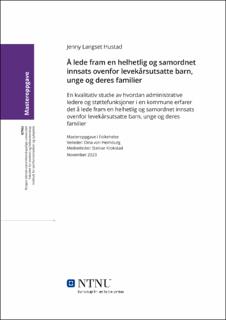Å lede fram en helhetlig og samordnet innsats ovenfor levekårsutsatte barn, unge og deres familier: administrative ledere og støttefunksjoners erfaringer fra en kommune
Master thesis
Permanent lenke
https://hdl.handle.net/11250/3126338Utgivelsesdato
2023Metadata
Vis full innførselSamlinger
Sammendrag
Denne masteroppgaven er tilknyttet NTNU WellFare sin følgeforskning av en kommunal pilot i den nasjonale 0-24 – satsingen. Hensikten med 0-24 piloten er å forbedre tjenestene til utsatte barn, unge og deres familier for å hindre utenforskap og sikre tidlig hjelp og tjenester til denne gruppen.
Et utilstrekkelig tjenestetilbud og manglende treffsikre tiltak kan føre til at levekårsutsatte barn og unge tar med seg levekårsproblematikk inn til voksenlivet, noe som kan bidra til en økning av sosiale helseforskjeller i befolkningen. Denne masteroppgaven utforsker hvordan administrative ledere og støttefunksjoner i en kommune erfarer det å lede fram en helhetlig og samordnet innsats ovenfor levekårsutsatte barn, unge og deres familier. De seneste årene har det kommet en rekke offentlige føringer som har uttrykt behovet for økt samordning og samhandling mellom helse-og sosialtjenestene for å kunne gi utsatte målgrupper den offentlige bistanden de har behov for. Formålet med masterstudien er å få økt kunnskap om administrativt arbeid når en kommune eksperimenterer med helhetlig og samordnede innsatser.
Denne kvalitative masterstudien er posisjonert innenfor en sosial konstruksjonistisk forståelsesramme. Datamaterialet ble samlet inn gjennom tre semistrukturerte gruppeintervju av administrative ledere og støttefunksjoner fra en kommune tilknyttet en kommunal pilot i 0-24-satsingen. System-og kompleksitetsteori og innovasjon kapasitetsbygging utgjorde denne masteroppgavens teoretiske rammeverk som ga analytisk forståelse i analysen og grunnlag for tolkning av resultatene i diskusjon. Datamaterialet ble analysert gjennom en refleksiv tematisk analyse og resulterte i fire hovedtemaer: 1) Samskaping krever endring i roller for innbyggere, ansatte og ledere, 2) Et behov for en organisasjonsstruktur og kultur for samarbeid på tvers, 3) Å lede fram en organisasjonskultur som fremmer helhetlig og samordnet innsats, 4) Helhetlig innsats og strategisk utviklingsarbeid krever mer fleksible rammeverk. Resultatene viser til at administrative ledere og støttefunksjoner har erfart mange forskjellige barrierer og muligheter fra ulike aspekter og nivåer i kommunen gjennom arbeidet med å lede fram helhetlige og samordnede innsatser ovenfor denne målgruppen. This master's thesis is part of NTNU WellFare's follow-up research on the 0-24 collaboration in a municipality in Norway. The purpose of the 0-24 pilot is to improve services for vulnerable children, young people and their families to prevent social exclusion and ensure early intervention through more comprehensive and coordinated initiatives.
Inadequate service provision and a lack of effective measures provided for vulnerable children and young people can contribute to an increase in social health disparities within the population. This master's thesis explores how administrative leaders and support functions in a Norwegian municipality experience leading a holistic and coordinated effort towards vulnerable children, young people and their families. In recent years, there have been a number of public policy guidelines that have expressed the need for increased coordination and interaction between the health and social services in order to provide good quality services for vulnerable groups. The purpose of the master's study is to gain increased knowledge of administrative work when a municipality experiments with holistic and coordinated efforts.
This qualitative master's study is positioned within a social constructionist framework of understanding. The data was collected through three semi-structured group interviews of administrative leaders and support functions from a municipality associated with a municipal pilot in the 0-24 initiative. Theoretical frameworks of systems-and complexity theory, along with innovation capacity building, constituted the theoretical framework of this study. It provided analytical understanding in the analysis and formed the basis for interpreting the results in the discussion. The data was analyzed through a reflexive thematic analysis and resulted in four main themes: 1) Co-creation requires a change in roles for citizens, employees and managers, 2) A need for an organizational structure and culture for cross-functional collaboration, 3) To lead the development of an organizational culture that promotes holistic and coordinated efforts, 4) Holistic effort and strategic development work demands more flexible frameworks. The results show that administrative managers and support functions in a municipality have experienced many different barriers and driving forces from different aspects and levels in the municipality through the work of leading holistic and coordinated efforts towards vulnerable children, young people and their families.
